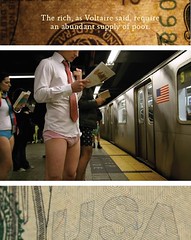
Image by Renegade98 via Flickr
The rich, Voltaire said, require
an abundant supply of poor.
It was during an earlier economic crisis that Richard Nixon famously said, "we're all Keynesians now." According to those I contacted, that's more true today than at any time in recent history; there's broad agreement in Washington that more government action will be required.Related articles by Zemanta
When I asked Galbraith about the prospect of running up large deficits, he responded that today "no serious person" in the economic establishment is a deficit hawk, adding that "it's striking how quickly consensus is moving" in Washington toward the idea that a major bailout of the "nuts and bolts" economy is needed. (Deficit spending to kick-start the economy during a downturn, as opposed to financing tax cuts for the wealthiest or paying for wars of choice, is a tried-and-true policy tool.)
Despite the general consensus among the experts I surveyed that we are almost certainly headed into very rough waters, there was cause for optimism as well, in that most agreed that aggressive and coordinated actions by government could contain the damage. More importantly, the bright spot in this crisis may be (stress on the word may) the blow it deals to the center-right, anti-regulatory paradigm that has guided economic policymakers both at home and in many of the world's capitals over the past three decades.
Of that paradigm, Bello said, "goodbye to all that," adding, "We should not underestimate the sea change that is occurring. Neoliberalism and free-market fundamentalism have been severely discredited, as has globalization." He predicted that "capitalism itself will come under severe questioning, and many will think that regulating or re-regulating it is not enough. I think you will find the same fundamental questioning happening throughout the world." He added, "Radical economics and Keynesian economics will regain respectability, and neoclassical or neoliberal (trickle-down) economics will be delegitimized."
Pollin wrote that he has hope that "the commitment to financial deregulation by mainstream economists and politicians -- Democrats as well as Republicans -- is now dead." He added: "It is time to recognize that unregulated financial markets always have, and always will, cause financial crises. There are no historical exceptions to this observation at all. This point has to be grasped."
According to Baker, the degree to which that point sinks in is an open question. "In principle," he said, "the Wall Street mentality that has dominated the political thinking of both parties should be on the defensive. These guys had it all their own way, and it led to a colossal disaster." But, he added, "in this country, failure doesn't count against you. It will be necessary for progressives to demand an end to Wall Street-driven policy. If there is successful organizing on this front, then it is possible that the next administration will take a very different course. But the Wall Street boys have to be pushed away -- they will not surrender power voluntarily."
Hahnel offered a word of caution, noting that "80 years ago people thought (unregulated) free market finance was dead. If the funeral had a name, it was Glass Steagall (the New Deal-era legislation that made banks choose between issuing mortgages and securities). In 1999 Phil Graham, Robert Rubin and Bill Clinton killed Glass Steagall, signaling the return and triumph of free market finance. Hopefully this crisis will kill free market finance once and for all. 'Never again' is the appropriate response."
He added what was perhaps the most salient point: "I hope this lesson will be the beginning of a larger lesson: The economics of competition and greed does not serve us well."
- Robert Skidelsky: Big government is back
- Robert D. Atkinson, Ph.D.: Who's Your Economic Daddy?
- Dani Rodrik: The Spence report offers a fresh look at growth and development
- Once again, it's the financiers who threaten us all
- Ideological and economic theories of change
- Rupert Russell: How Bill Buckley's Hatred of the New Deal Brought the Wall Street Crash of 2008

![Reblog this post [with Zemanta]](http://img.zemanta.com/reblog_e.png?x-id=06573ec3-fbc9-424e-a95b-3f2dec677b5f)

No comments:
Post a Comment